牛津译林8A Unit5reading 知识点
(完整版)江苏牛津译林8AUnit5-8知识点归纳,推荐文档

树人中学8AUnit5 知识点归纳一重点短语1.in the wild 在野外2. wild animals 野生动物2.be free 自由 4. any time 随时5.no way 不可能,没门6. have/take pity on 同情,怜悯7.in fact 实际上8. giant panda 大熊猫9.be born 出生,出世10. look like 看起来像11.at four months old 在四个月大时12. for the first time 第一次13.in the beginning 一开始14. live on 以食……为生15.as a result 因此,结果16. in danger 处境危险17.take action 采取行动18. right away=right now 立刻,马上19.at birth 出生时,诞生时20. look after herself 照看她自己21.not any more=no more不再22. face serious problems面临严重的问题23.get lost 迷路24. the same...as 与……一样25.have no place to live 没有地方住26. start/begin to do 开始做某事27.be afraid of害怕……28. work as a team 作为一个团队而工作,团队协作29.work out maths problems 解决数学问题30. live alone 独自生活31.smell things far away 闻到远处的东西32. for a short while 一会儿33.because of 因为,由于34. your sincerely 你真诚的35.in the daytime 在白天36. sleep through the winter 冬眠37.move around slowly 缓慢地四处移动二重点句型1.They may become dishes on the table any time. 它们随时可能成为餐桌上的菜。
新译林8A英语UNIT 5单元知识点归纳及练习题(含答案)

新译林8A英语UNIT 5单元知识点归纳及练习题8A Unit 5 Wild Animals一、词汇大集合the daytime 在白天way不可能/take pity on sb.同情某人through the winter 冬眠fact 实际上,事实上the beginning 一开始, 起初(at first) in the beginning 一般不与of连用。
◇at the beginning 常与of 连用,表“在...之初”◇at the beginning 也可单独使用,表示“起初,开始”,这时可与in the beginning替换。
mainly on … 主要以...为生危险n. dangerous 危险的adj.be in danger 处于危险中;animals in danger 处境危险的动物;be out of danger 脱离危险9. take action= do something 采取措施/ 行动away = at once = right now 立刻, 马上birth 出生时,诞生时lost =lose one ’s way 迷路same ...as 与... 一样She has the same book as you.a living 谋生, 维持生计in the wild 在野外time 在任何时候;随时just 100 grams 只重100克to go outside for the first time 开始第一次走到外面four months old 在四个月大时months later 八个月之后… any more = no more不再serious problems 面临严重的问题23. a special kind of…. 一种特殊的...anything special 一些特别的事25.不定式做后置定语:have a place to live, have some food to eat,have books to read, have some rooms to cleanmore panda reserves 建更多熊猫保护区laws制定法律;lawyer 律师nothing 不采取措施;什么都不做into the world 来到这个世界their lives 在他们一生中towards … 朝...走去afraid of sth. 害怕某事/物be afraid of doing sth. 害怕做某事be afraid to do sth. 不敢做某事with one’ s eyes closed 闭着眼站着around 跳来跳去out easy maths problems 解决/做出简单的数学题the help of 在...的帮助下some food 储存一些食物save v. 储存;救;节约a short while 片刻/ 很短时间able to能够ability n. 能力them for their fur, bones or other parts of the body.捕捉他们以获得他们的皮毛、骨头或身体的其他部位as a team 团队合作/团队协作living areas 丧失居住地dangerous to humans 对人类有危险things far away 闻到远处的东西for fun 为了寻乐而杀戮47. lose one’s life 丢掉性命animals’ fur 卖动物皮毛to do sth. = take action to do sth行动起来去做某事to protect wild animals行动起来保护野生动物their own families 拥有他们自己的家庭report on an animal in danger 关于一种处境危险的动物的一则报告二、句型大集合are the kings of the animal world. 狮子是动物界的王者。
牛津译林版8AUnit5 Wild animals基础考点大梳理

牛津译林版8AUnit5 Wild animals基础考点大梳理一、必会单词1.wild野生的;自然环境,野生状态2.free自由的,不受束缚的3.thick厚的,密的,浓的4.dolphin海豚5.panda熊猫6. squirrel松鼠7. zebra斑马8. stripe条纹9. bat蝙蝠10.bee蜜蜂11. wolf狼12. insect 昆虫13. tail尾巴14. illness疾病15. danger危险16. action行动;行为17. reserve (动植物)保护区18. pity遗憾,可惜19. shame憾事;羞愧20. hunter猎人21.catch捉住,捕获22.kill杀死23.die死24.lose失去二、常考短语1. wild animals野生动物2. live in the wild在野外生存3. any time任何时候4.no way不可能5. have/take pity on同情,怜悯6.in fact实际上,事实上7. be born出生8. look like看起来像9. at four months old在四个月大的时候10. for the first time首次,第一次11. no..any more不再12. in the beginning 开始13. look after herself照顾她自己14. for example例如15. as a result 因此16. live on以食....为生17. in danger处境危险18. take action采取行动19.right away立刻,马上20. at first首先21.at birth出生时,诞生时22. get lost迷路23. the same...as....样24. with the help of 在......的帮助下25. for a while一会儿26. far away遥远的27. be dangerous to humans对人类有危险28. catch...for...因为....而捕捉.....29. because of因为30. lose one's life失去生命31. be good at擅长32. in the daytime在白天33. sleep through the winter冬眠三.综合用法1. Why not+do sth.?表示提建议,意为“为什么不做某事呢?2. Could you please ( +not) +do sth.?请你(不要)做某事好吗?3. What..do you like best?你最喜欢的....是什么?4. look作连系动词,其后接形容词作表语。
牛津译林版八年级上8AUnit5知识点梳理
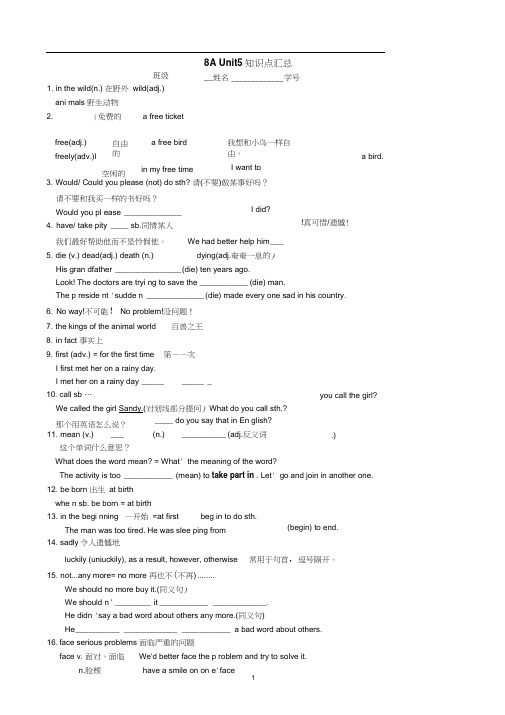
班级 1. in the wild(n.) 在野外 wild(adj.) ani mals 野生动物 (免费的 2. free(adj.) freely(adv.)l空闲的 自由的 a free ticket a free bird 8A Unit5知识点汇总__姓名 _____________ 学号 我想和小鸟一样自由。
I want to a bird.in my free time 3. Would/ Could you please (not) do sth? 请(不要)做某事好吗? 请不要和我买一样的书好吗?Would you pl ease _____________ 4. have/ take pity ____ sb.同情某人我们最好帮助他而不是怜悯他。
We had better help him ___ 5. die (v.) dead(adj.) death (n.) dying(adj.奄奄一息的) His gran dfather _______________(die) ten years ago. Look! The doctors are tryi ng to save the ___________ (die) man. The p reside nt 'sudde n _____________ (die) made every one sad in his country. 6. No way!不可能! No problem!没问题! 7. the kings of the animal world 百兽之王 8. in fact 事实上 9. first (adv.) = for the first time 第——次 I first met her on a rainy day. I met her on a rainy day _____ _____ _ 10. call sb … We called the girl Sandy.(对划线部分提问) What do you call sth.? 那个用英语怎么说?I did? !真可惜/遗憾! you call the girl?____ do you say that in En glish? (n.) __________ (adj.反义词 11. mean (v.) ___ 这个单词什么意思? What does the word mean? = What ' the meaning of the word?The activity is too ___________ (mean) to take part in . Let ' go and join in another one. 12. be born 出生 at birth whe n sb. be born = at birth 13. in the begi nning —开始 =at first beg in to do sth. The man was too tired. He was slee ping from 14. sadly 令人遗憾地 luckily (uniuckily), as a result, however, otherwise 常用于句首,逗号隔开。
译林版牛津英语8AUnit5单元知识点整理

8A Unit 5单元知识点一、重点单词1.wild野生的;自然环境,野生状态2.free自由的,不受束缚的3.dish-道菜;盘,碟4.pity同情;可惜,遗憾5.die死6.zebra斑马7.mean意思是,意味着8.beginning开始,起初9.sadly令人遗憾地,不幸地;伤心地10.face面临;面对11.mainly主要地;大部分12.danger危险13. action行动;行为14. living生存,生计15.result结果16.reserve(动植物)保护区17. law法律,法规18.none没有一个(人或物)19.closed关闭的20. lost迷路的,迷失的21.save储存,节省22.while -会儿,一段时间23.catch捉住,捕获24.wolf(pl. wolves)狼25. thick厚的;密的;浓的26. lose失去,被……夺去;输掉27.kill杀死28. human人29.sorry难过的,遗憾的30.sell卖,出售31.shame憾事;羞愧32.act行动;表演33.illness疾病34.accept接受,收受35.report报告36.tail尾巴37,move活动,移动,搬迁38.slowly缓慢地二、重点短语1.live in the wild生活在野外2.no way(口)不可能3.giant panda大熊猫4.have/take pity on同情,怜悯5.in fact实际上,事实上6.the kings of the animal world动物世界的国王7.call her Xi Wang称呼她为希望8. look like看起来像9.be born出生,出世10.at four months old在四个月大时11. not any more不再12. for the first time第一次13.in the beginning -开始14. learn to look after herself学会照料她自己15.face serious problems面对严重的问题16.for example例如17.at birth出生时,诞生时18.have babies生孩子19.become smaller and smaller变得越来越少20. live on以食……为生21.a special kind of bamboo 一种特殊的竹子22.bamboo forests竹林23.as a result因此24.in danger处境危险25.take action采取行动26.right away立刻,马上27.get lost迷路28.the same as与……同样29.make laws制定法律30.none left 一个都不剩31. jump around到处跳跃32.with the help of their mouth and ears在它们的嘴和耳朵的帮助下33.for a short while 一会儿34.catch tigers for their fur捕捉老虎取它们的皮毛35.things far away远处的东西36.work as a team以群体的形式行动37.Kill for.因……而杀死……38.any reason任何理由39.in the daytime在白天三、重点句子及点拨1. Why not? Wild animals are free and happy.为什么不呢?野生动物是自由和开心的。
牛津译林版英语8A Unit 5 重点短语和句子

牛津课本八年级 U5 重点知识归纳一、词组或短语1. 生活在野外2. 不可能 l ive in the wi ld no way3. 同情穷人 have / t ake p i ty on poor peop lein fac t4. 实际上,事实上5. 动物世界之王6. 称他为圣诞老人7.看起来像只白老鼠8.重 100 克 the k ings o f the an i mal wor ldca l l h im Fa ther Chr i s tmaslook l ike a whi te mouseweigh 100 g rams9.开始第一次走出她的家门 10.不再… s ta r t to go ou t s ide her home for the f i r s t t imenot… any more11.一开始 in the beg inn ing12.面对严重的问题 face se r ious p rob lems13.主要以吃一种特殊的竹子为生 live main ly on a spec ia l k ind o f bamboo14.因此 as a resu l t15.有住的地方 have a p lace to l ive(be) in danger16.处在危险之中 17.采取措施干某事 18.立刻,马上 t ake ac t ion to do s t hr igh t away=a t oncebui ld more panda r eservesmake l aws to p ro tec t pandasl ea rn to look a f t e r herse l fcome in to the wor l d as a babyge t s i ck19.建造更多的熊猫保护区 20.制定法律保护熊猫 21.学会照顾她自己 22.出生/ 出世 23.生病 24.出生时,诞生时 25.半年 a t b i r thha l f a year26.害怕做某事 be a f ra id o f do ing s ths leep with one’s eyes closedget lost=lose one’s waywork ou t a maths prob lemwork i t /them ou t27.闭着眼睛睡觉 28.迷路 29.解答一道数学题 30.解决它/它们 31.在老师的帮助下 32.与…同样 with the he lp o f the t eacherthe same ---as33.一会儿 fo r a shor t whi le34.捉老虎取它们的皮毛和骨头 35.身体的其它部分 36.以团队形式一起工作 37.对人有危险 ca tch t ige r s fo r thei r fu r and bonesother pa r t s o f the bodywork as a t eambe dangerous to humansfewer and fewer l i ving a reaski l l fo r fun38.越来越少的生存区域 39.为取乐而杀害 40.失去生命 lose one’s life=dieneed our p ro tec t ion41.需要我们的保护42.有快乐和悲伤的感觉 43.谢谢你的好意 have fee l ings o f happiness and sadnessthank you fo r your kindnessaccep t our inv i ta t ion44.接受我们的邀请 45.一份有关处于危险中的动物的报告 a repor t on an an i mal in dangerm ove a round s lowlyin the day t imes leep th rough the winte r46.四周慢慢地走走 47.在白天 48.整个冬天睡觉 二、重点句子及句型:1. 你愿意生活在野外吗?W ould you l ike to l ive in the wi ld?2.你最喜欢什么野生动物?(2 种)W hat wi ld an imal do you l ike bes t? = What i s your favor i t e wi ld an imal?3. 当“希望”出生时,她只有 100 克。
牛津译林版八年级下册8A Unit 5 知识点精讲
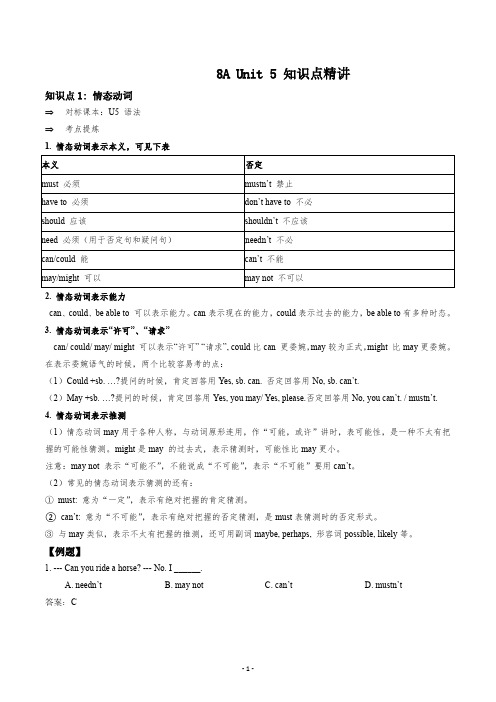
can/could 能
can’t 不能
may/might 可以
may not 不可以
2. 情态动词表示能力 can、could、be able to 可以表示能力。can 表示现在的能力,could 表示过去的能力,be able to 有多种时态。
3. 情态动词表示“许可”、“请求” can/ could/ may/ might 可以表示“许可” “请求”, could 比 can 更委婉,may 较为正式,might 比 may 更委婉。
D. have to
答案:B
解析:此题考查的是 may 表示请求的用法。May we..? 肯定回答用 Yes, you may./ Yes, please. 否定回答用
No, you can’t./mustn’t. 所以此题答案是 B。
【练习】
1. --- May I smoke here? --- ______, you ______. It can be dangerous.
你有可能切到手指。“有可能”用 may,所以此题答案是 D。
3. --- May we leave the classroom now? --- No, you ______. You shouldn't leave until the bell rings.
A. may not
B. can’t
C. needn’t
can’t.所以此题答案是 C。
2. Look out! The knife is very sharp. You ______ cut your finger.
A. need
B. must
C. should
D. may
答案:D
牛津译林版8A Unit5重要知识点

8A U5【welcome】1.wild 不可数名词“自然坏境,野生状态”in the wild在野外,处于野生状态adj.“野生的”wild animals 野生动物2.free adj.自由的,不受束缚的( →freer→freest) be free/feel free to do sth随意做某事adj.免费的;空闲的→freely adv.无拘无束地;自由自在地3.dish 可数名词“一道菜”可数名词“盘,碟”do the dishes清洗餐具4.--So could you please not eat them? --No way![ Could/Would you please (not) do sth? ] 一种表示请求的巨型,语气比较委婉、客气。
肯定回答:Sure./Of course./No problem.否定回答:Sorry,but I....[ no way ] “不可能”常用在口语中,表示不同意或拒绝。
还可以表示不相信或惊讶“不会吧”5.pity 不可数名词“同情,怜悯”have /take pity on... 同情....可数名词“可惜,遗憾”常用单数形式what a pity! 真可惜!6.die vi.死现在分词dying 过去式、过去分词dieddeath n.死亡dead adj.死的die of...死于...(疾病,年老,劳累等内部原因)die from... 死于...(事故,地震,饥饿等外部原因)7.in fact事实上,实际上=actually(用于强调与实际情况恰恰相反)8.--What...do you like best? = What is/are your favourite...?--I like...best. =My favourite...is/are...【reading】1.mean vt.意思是,意味着过去式meant→meaning n.意义,意思→meaningful adj.有意义的→meaningless adj.无意义的●mean意为“意思是...”时,后接that引导的宾语从句。
牛津译林版8A Unit5知识点及语法点讲解(有答案)

8AU5词汇+可数名词与不可数名词/代词another/(the)other(s)课文复习根据课文原文完成下列空格。
DinosaursDinosaurs lived on the Earth over sixty million years ago. This was a long time before people _____1_____. Dinosaurs lived everywhere. Some were as small as chickens. Others were as big as ten elephants. Some dinosaurs even had wings and could fly.Many dinosaurs were _____2_____. They were as gentle as sheep and ate plants. Other were hamful. They were fiercer than tigers and ate meat.Dinosaurs all died out suddenly. Nobody knows why. We know about the lives of dinosaurs from the skeletons, eggs and _____3_____ they left behind.DiogenesDiogenes was a famous thinker.he lived in Greece about two thousand years ago. He taught that the way to be happy was to own as few things as _____4_____. All he owned was a big jar that he lived in , a coat, a bag and a cup. He was very happy. One day, Diogenes saw a boy drinking water form his hands by a ______5_____, so he threw away his cup and became even happier.Disney, WaltDisneyland is a famous amusement park in the USA. Disneyland was created by Walt Disney, who is famous for his cartoon _____6_____: Mickey Mouse, Donald Duck,Goofy, Snow White and many others.Disney was born in the USA. After leaving school, he sold newspapers and _____7_____ mail. At the same time, he studied art at night. Finally he got a job that he really liked-drawing cartoons for films.Disney’s most famous cartoon character, Mickey Mouse, was a real mouse. It sometimes saton Disney’s desk while he was working. Disney drew the mouse and put it in a cartoon. Soon Mickey became a star and Disney became rich and famous.【答案】1.existed 2.harmless 3.footprints 4.possible 5.fountain 6.characters 7.deliveredPart 2 根据音标写单词8A U5Vocabulary【答案】1.Africa 2.Europe 3.fierce 4.encyclopedia 5.dinosaur 6.exist7.even 8.harmful 9.die out 10.skeleton 11.footprint 12.thinker 13.Greece 14.as soon as possible 15.jar 16.amusement park 17.create 18.character 19.while 20.cause 21.disease ernment 23.repair 24.fee 25.journeyPart 3 词汇复习(1)8A U5词性转换整理【答案】1.Africa African 2.Europe European3.Greece Greek4.harm harmful harmless 5.create creative creation creativity6.real really realize7.exist existenceU5知识点梳理根据中文写出相应的英文1.though conj.虽然,尽管,即使E.g.1)I felt very cold, ________(虽然)I was wearing a thick coat.2)__________(尽管)she was in a hurry, she stopped to talk to me.【答案】1) though 2)Though2.create v.创造,创建E.g.1)Some people believe God __________(创造)the world.2)Who was the ___________(创造者)of the electric?3)My brother is a ___________(有创造力的)boy because he is always makes some strange things.【答案】1) created 2) creator 3) creative3.exist v.存在E.g.1)The old lady _________(生存)only on coffee and bread.2)Such an idea _________(存在于……之中)only __________ the minds of poets.3)She __________(靠……生存)only __________ milk.【答案】1) exists 2) exists, in 3) existed, on4.even adv.甚至E.g.1)___________(甚至)Mrs Smith could not help laughing.2)This dictionary is __________ ________ ________(更有用)than that one.3)I have explained everything, but _________(甚至)now she doesn’t understand.【答案】1) Even 2) even more useful 3) even5.harmful adj.有害的harmless adj.无害的E.g.1)The new drug has no ___________(有害的)side effects.2)Their dog seems fierce, but he’s ___________(无害的).3)The flood _________ _________ _________ _________ _________(严重损坏)to the crops.【答案】1) harmful 2) harmless 3) did a lot of harm6.nobody pron.没有人E.g.1)There was ___________(没有人)at home.2)____________(一点也没有)of the food was left.【答案】1) nobody 2) None7.while conj.与……同时E.g.1)The telephone rang ___________(当……的时候)I was having a shower.2)I listen to the radio ___________(同时)I’m eating my breakfast.3)____________(当……时)he was eating, I asked him to lend me 20 yuan.【答案】1) while 2) while 3) While8.cause v./ n.引导,导致,原因E.g.1)The fire _________ __________ __________(由……引起)a cigarette end.2)Bad driving is the ___________(原因)of most road accidents.【答案】1) was caused by 2) cause9.believe v.相信E.g.1)Long ago, people __________(相信)that Earth was flat.2)He __________ __________(相信)getting plenty of exercise.3)__________ ___________(相信我), you will get well very soon.【答案】1) believed 2) believes in 3) Believe me可数名词&不可数名词语法重难点1)规则变化2)不规则变化(1)单数变复数记忆口诀:单数变为复数式,后加s统言之。
牛津译林版8AUnit5~8知识点
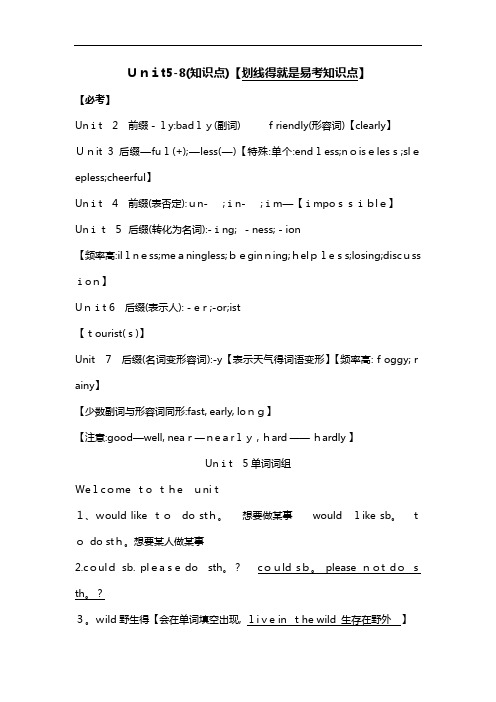
Unit5-8(知识点)【划线得就是易考知识点】【必考】Unit 2 前缀-ly:badly(副词) friendly(形容词)【clearly】Unit 3 后缀—ful(+);—less(—)【特殊:单个:endless;noiseless;sleepless;cheerful】Unit 4 前缀(表否定):un- ;in- ;im—【impossible】Unit5后缀(转化为名词):-ing; -ness;-ion【频率高:illness;meaningless;beginning;helpless;losing;discuss ion】Unit 6 后缀(表示人):-er;-or;ist【tourist(s)】Unit 7 后缀(名词变形容词):-y【表示天气得词语变形】【频率高:foggy;rainy】【少数副词与形容词同形:fast,early,long】【注意:good—well,near—nearly,hard——hardly】Unit 5单词词组Welcome to the unit1、would like todo sth。
想要做某事would like sb。
todo sth。
想要某人做某事2.couldsb. please do sth。
?could sb。
please not dosth。
?3。
wild野生得【会在单词填空出现, live in the wild 生存在野外】4.have /take pity on sb。
同情某人It's apity!真遗憾!5。
die【非选择题中易考时态变形,die <动词〉死亡过去式:died 现在分词:dying(也可作形容词:垂死得) 形容词:dead 名词:death 】eg. Hisfather diedten yearsago。
His father's death makeshim feel sad。
His father wasdead、The doctor saved a dying boy.6.Infact事实上7。
2021年牛津译林版中考英语复习讲义(考点归纳及练习)(八年级上册 Unit5)
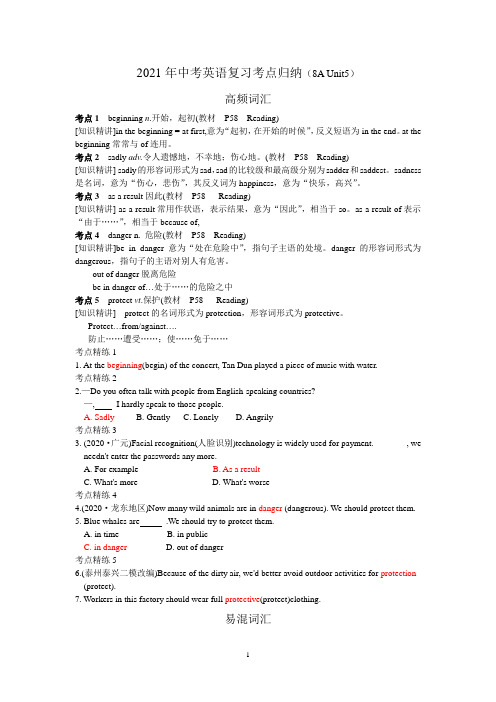
2021年中考英语复习考点归纳(8A Unit5)高频词汇考点1beginning n.开始,起初(教材P58 Reading)[知识精讲]in the beginning = at first,意为“起初,在开始的时候”,反义短语为in the end。
at the beginning常常与of连用。
考点2sadly adv.令人遗憾地,不幸地;伤心地。
(教材P58 Reading)[知识精讲] sadly的形容词形式为sad,sad的比较级和最高级分别为sadder和saddest。
sadness 是名词,意为“伤心,悲伤”,其反义词为happiness,意为“快乐,高兴”。
考点3 as a result因此(教材P58 Reading)[知识精讲] as a result常用作状语,表示结果,意为“因此”,相当于so。
as a result of表示“由于……”,相当于because of,考点4 danger n. 危险(教材P58 Reading)[知识精讲]be in danger意为“处在危险中”,指句子主语的处境。
danger的形容词形式为dangerous,指句子的主语对别人有危害。
out of danger脱离危险be in danger of…处于……的危险之中考点5 protect vt.保护(教材P58 Reading)[知识精讲] protect的名词形式为protection,形容词形式为protective。
Protect…from/against….防止……遭受……;使……免于……考点精练11. At the beginning(begin) of the concert, Tan Dun played a piece of music with water.考点精练22.—Do you often talk with people from English-speaking countries?—, I hardly speak to those people.A. SadlyB. GentlyC. LonelyD. Angrily考点精练33. (2020·广元)Facial recognition(人脸识别)technology is widely used for payment._______ , we needn't enter the passwords any more.A. For exampleB. As a resultC. What's moreD. What's worse考点精练44.(2020·龙东地区)Now many wild animals are in danger (dangerous). We should protect them.5. Blue whales are .We should try to protect them.A. in timeB. in publicC. in dangerD. out of danger考点精练56.(泰州泰兴二模改编)Because of the dirty air, we'd better avoid outdoor activities for protection (protect).7. Workers in this factory should wear full protective(protect)clothing.易混词汇考点1die, dying, death与dead(教材P56 Comic strip)[知识精讲] 1. die是动词,意为“死,死亡”,是非延续性动词,不能与表示一段时间的状语连用。
牛津英语译林版8AUnit5知识点梳理

8A U5 知识点梳理一、词组1.live in the wild生活在野外2.be free to do sth.自由地做某事3.the baby panda 小熊猫4.have/take pity on同情,怜悯5.in fact实际上,事实上6.the kings of the animal world动物世界的国王7.call/name her Xi Wang称呼她为希望(she is called named Xi Wang) 8. at birth出生时,诞生时9.be born出生,出世10.at four months old在四个月大时11. not …any more= no more不再12. for the first time第一次13. in the beginning (=at first)开始14. learn to look after herself学会照料她自己learn to do sth. 15.face serious problems面对严重的问题in face of…16.bamboo forests become smaller and smaller竹林变得越来越少17.live mainly on主要以……为生18.cut down trees砍伐树木cut them down19.as a result因此/ as a result of 作为…的结果20. be in danger处境危险21.be out of danger脱离危险22.the same as与……同样23.be different from 与…不同24.drink her mother’s milk 喝奶25.take action to do sth…采取行动26.right away立刻,马上/ at once27.get lost迷路/ be missing/lose one’s way28.build more panda reserves 建立更多的熊猫保护区29.make laws to do 制定法律30.for any reason任何理由31. in the daytime在白天32.with the help of在…的帮助下33.for a short while 一会儿34.catch tigers for their fur捕捉老虎取它们的皮毛35.far away远处的36.work as a team以群体的形式行动37. be afraid of sb,/ sth./ doing sth. 害怕38. live alone 独自生活39. catch…for…因为…而捕捉…40. sleep through the winter 冬眠41. large paws大的爪子42. lose living areas 丢失居住地43. run for hours without stopping 几小时不停的跑44. accept our invitation接受我们的邀请45. jump around 跳来跳去46. for example用于举例二、句子1. Why not?Why not?表示赞同别人的建议,相当于Good idea! I think so.等。
牛津译林版八年级上册第五单元知识点

8A Unit 5 知识点1. Would you like to live in the wild,Eddie?1)would like to do sth.=want to do sth.但语气更加委婉2)wild adj.野生的/n.自然环境wild life/animals 野外生活/野生动物wildly adv.in the wild处于野生状态The children are wild with joy.欣喜若狂Fewer than a thousand giant pandas still live in the wild.翻译:花园里长了一些野花。
2. Please have pity on them.1)please可引导祈使句,后面加动词原形2)pity n.怜悯;同情;遗憾;可惜(have/take pity on)v.同情;怜悯The old lady often takes pity on small animals.那位老太太常常怜悯小动物。
I pity anyone who has to feed a family on such a low income.我同情任何需要以如此微薄的收入养活全家的人。
It's a pity that you can't come to the party.你不能来参加这次聚会,真可惜。
What a pity!真遗憾,可惜!3. I may die without them.1)die v.die out 消失; 灭绝; 逐渐消失; 灭亡die off 死去; 相继死去die of(内因)/from(外因)死于.. be dying for 渴望Sadly, both he and my mother died of cancer.I'm dying for a breath of fresh air.2)dead adj.死了的death n.死亡dying垂死的Car accidents caused many deaths.车祸造成很多人死亡。
Unit 5 Reading 知识点整理及练习 牛津译林版英语八年级上册
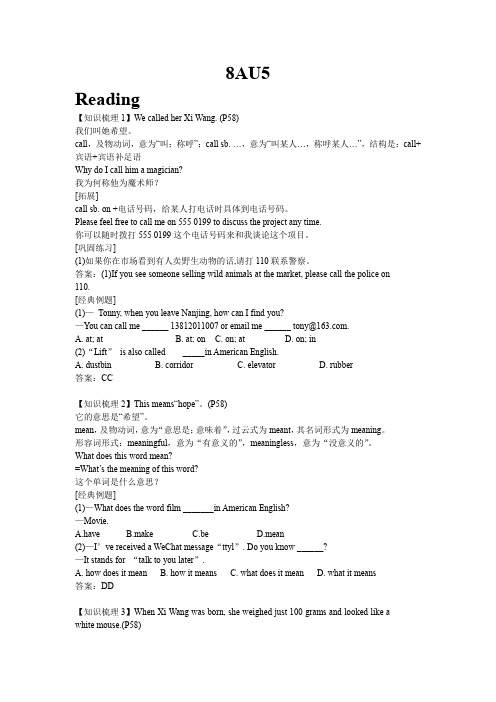
8AU5Reading【知识梳理1】We called her Xi Wang. (P58)我们叫她希望。
call,及物动词,意为“叫;称呼”;call sb. …,意为“叫某人…,称呼某人…”,结构是:call+宾语+宾语补足语Why do I call him a magician?我为何称他为魔术师?[拓展]call sb. on +电话号码,给某人打电话时具体到电话号码。
Please feel free to call me on 555 0199 to discuss the project any time.你可以随时拨打555 0199这个电话号码来和我谈论这个项目。
[巩固练习](1)如果你在市场看到有人卖野生动物的话,请打110联系警察。
答案:(1)If you see someone selling wild animals at the market, please call the police on110.[经典例题](1)—Tonny, when you leave Nanjing, how can I find you?—You can call me ______ 138******** or email me ______ tony@.A. at; atB. at; onC. on; atD. on; in(2)“Lift”is also called _____in American English.A. dustbinB. corridorC. elevatorD. rubber答案:CC【知识梳理2】This means“hope”。
(P58)它的意思是“希望”。
mean,及物动词,意为“意思是;意味着”,过云式为meant,其名词形式为meaning。
形容词形式:meaningful,意为“有意义的”,meaningless,意为“没意义的”。
What does this word mean?=What’s the meaning of this word?这个单词是什么意思?[经典例题](1)—What does the word film _______in American English?—Movie.A.haveB.makeC.beD.mean(2)—I’ve received a WeChat message“ttyl”. Do you know ______?—It stands for “talk to you later”.A. how does it meanB. how it meansC. what does it meanD. what it means答案:DD【知识梳理3】When Xi Wang was born, she weighed just 100 grams and looked like awhite mouse.(P58)当希望出生时,她的体重只有100克,并且看起来像一只小白鼠。
牛津译林版八年级上 8A Unit5 知识点梳理

牛津译林版八年级上 8A Unit5 知识点梳
理
本文档旨在对牛津译林版八年级上册第5单元的知识点进行梳理。
以下是本单元的重点内容:
1. 主题:本单元的主题是关于“学校生活和课余活动”。
3. 语法:本单元的重点语法是used to 和be used to的用法。
用于表达过去惯、经验和现在的熟悉程度。
4. 句型:本单元的重点句型包括:
- I used to play basketball every day. (我过去每天打篮球。
)
- She is used to getting up early. (她惯早起。
)
- Did you use to watch that TV show? (你过去常看那个电视节目吗?)
- What did you use to do after school? (放学后你过去经常做什么?)
5. 阅读与听力:本单元的阅读与听力材料包括关于学校课余活动、学生选修课程和校园惯的相关内容。
通过阅读和听力训练,提高学生的阅读理解和听力技能。
6. 写作:本单元的写作训练主要是让学生描述自己过去和现在的课余活动,并分享自己的兴趣爱好与他人。
请根据教材内容进一步拓展并适当举例补充本单元的知识点,以便更好地帮助学生掌握相关知识和技能。
牛津译林8aunit5知识点

Unit5复习重点词单组词看起来很美味没地方居住没有了食物意味着⋯没有人采取行动与某人玩耍鼓励sb干sth中了解处于危险不同种类的脱离危险野生动物失去生命在陆地上不得不在水里把⋯当宠物养大熊猫团体工作小熊猫用骨头制药看起来像吃药一只小白鼠给s b写信出生两匹狼在十个月大的时候多遗憾啊!开始干某事赚钱第一次做出正确决定长成⋯的成员起初一次在野外⋯的数量重问题足够的食物面临严将来四处转转比如在白天独自爬树引起麻烦很少伤人失去居住地两整天一直⋯最喜欢砍伐森林不再句型1.Yourfoodlooksdelicious.look(看起来)smell(闻起来)主系表结构五个感官动词f eel(摸起来)+形容词sound(听起来)taste(尝起来)2.Thennoonewillplaywithyou.数单用noone,没有人。
做主语时,谓语动词常Ivisitedyouyesterday,but_________athome.昨天我去找你,但是没人在家。
3.Whenxiwangwasborn,sheweightedjust100grams.weight重量,对重量提问,用“Howmuch”对时间段提问,用“Howlong”,答语是“for+时间段”对频率提问,用“Howoften”对数量提问,用“Howmany+可数n复数”,“Howmuch+不可数n”对距离提问,用“Howfar”对年龄提问,用“Howold”4.Sadly,itisverydifficultforgiantpandastosurviveinthewild.(1)sadly副词放在句首,类似有:luckily,finally,perhaps,maybe,easil⋯y(2)Itis+adj+forsbtodosth.对某人来说做某事很⋯常用形容词有(important/difficult/necessary/hard/easy⋯)Itis+adj+ofsbtodosth.某人做某事很⋯(侧重于描述人的品质或特征)常用形容词有(kind/friendly/generous/helpfu)l⋯。
译林版牛津英语8A Unit 5 单词知识点讲解
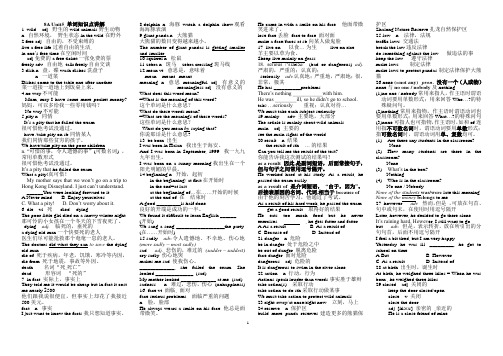
8A Unit5 单词知识点讲解1. wild adj. 野生的wild animals野生动物n. 自然环境,野生状态in the wild在野外2.free adj. 自由的,不受束缚的live a free life过着自由的生活,in one’s free time在空闲时间adj.免费的a free ticket一张免费的票freely adv. 自由地talk freely自由交谈3.dish n. 盘,碟wash dishes洗盘子n. 一道菜Dishes come to the table one after another.菜一道接一道地上到饭桌上来。
4.no way不可能--Mum, may I have some more pocket money?妈妈,可以多给我一些零用钱吗?--No way.不可能5.pity n. 同情It’s a pity that he failed the exam.很可惜他考试没通过。
have /take pity on sb同情某人我们同情那些贫穷的孩子。
We have/take pity on the poor children.n. “可惜的事,令人遗憾的事”(可数名词) ,常用单数形式很可惜他考试没通过。
It’s a pity that he failed the exam.What a pity!真可惜!---My mother says that we won’t go on a trip to Hong Kong Disneyland. I just can’t understand. ---______You were looking forward to it.A.Never mind.B. Enjoy yourselves.C. What a pity!D. Don’t worry about it.6. die vi. 死died -- dyingThe poor little girl died on a snowy winter night.那可怜的小女孩在一个冬天的下雪夜死了。
- 1、下载文档前请自行甄别文档内容的完整性,平台不提供额外的编辑、内容补充、找答案等附加服务。
- 2、"仅部分预览"的文档,不可在线预览部分如存在完整性等问题,可反馈申请退款(可完整预览的文档不适用该条件!)。
- 3、如文档侵犯您的权益,请联系客服反馈,我们会尽快为您处理(人工客服工作时间:9:00-18:30)。
Look like 动词短语,看起来像· · · Look like & be like
Look like 多指外表,外观上看起来,看上去像· · · 回 答相关问题时,用表特征的词。 Be like意为“像· · · 一样;就像···”,常用来表示(外 表或内在特征)是什么样的。 Later ,后来,以后,既可用于将来时,也可用于过 去式时,与时间段连用时,指过去或将来某一段 时间算起的,“· · · 后,过了····” Two days later,两天后
none / no one / nobody
1.none既可指人又可指物,意为“没有任何人或物; 一个人也没有”,常用于三者及以上的人或物。后 可与of短语连用,作主语时,谓语动词用单数或复 数均可。 它通常用来强调数量之少,因而常用来回答how many或how much引起的问句。 2.no one等于nobody,只能指人,不接of短语,作主 语时,谓语动词只有单数。不强调数量,可用来回 答who问句。
1、从语义上看,but所表示的是非常明显的对比,转 折的意味较however要强。 2、从语序上看,but总是位于所引出的分句之首,而 however却可位于句首、句中和句末。 3、从标点符号上看,but之后一般不得使用逗号,而 however则必须用逗号与句子其它部分分开。
比较级+and+比较级:表示越来越· · · 其后不接 ‘than’ It’s getting colder and colder.天气变得越来越 冷了。 一些多音节和部分双音节的形容词和副词在 表示越来越的时候,需用结构“more and more+adj/adv”. More and more beautiful,越来越漂亮。
Learn from (向某人学习;从中吸取教训); learn of (听说,了解到) 如 learn music, learn new words, learn to skate, learn from experience,
2. study为“学习,研究”,强调学习的过程,指
深入系统地学习,带有努力,勤奋的意味。其学 习对象往往是科学,艺术和需要深入探讨,研究 的问题及学科,不是单纯地获得技巧。 Study 作名词时,是“书房”或“学习”的意思。 如:study medicine, study science, study a map, study engineering, study painting。
Over 超过,在· · · 以上 作介词时:
1、在· · · 上方 there is a bridge over the river.河上方有座桥。 2、遍及, we have friends all over the world.我们的朋友遍天 下。
作副词时: 1、结束,The film is over.电影结束了。
Not…any more
其中not用在系动词,助动词或情态动词之后,而 any more 位于句末,表示动作次数、频率不再延 续。Not …any more 一般修饰非延续性动词,相 当于no more.
Not…any more =no more,表示动作发生的次 数,频率不再延续。常用于过去,现在, 将来时,修饰非延续性动词。 Not …any longer=no longer,表动作,状态 或时间不再延续,常用于过去或将来时, 修饰延续性动词。
1) --- Who’s in the classroom? --- No one. / Nobody. 2) --- How many animals can you see in the picture? --- None.
2、经过,The plane flew over about an hour ago. 飞机一小时前飞过去了。
In the beginning 相当于at first, 一开始,起初 At the beginning 也表示起初,开始的意思, 常与of 连用,表示在· · · 开始的时候。 At the beginning of the year 在一年开始的时候。 Begin to do sth /begin doing sth 可互换。但
Call 把· · · 称作,称呼 Call sb sth ,把某人称作· · · Call 还有呼唤召唤的意思
Call for 需要,要求 call in 召集 call(up) sb 给某人打电话 call on sb to do sth号召某人做某事
This means ‘hope’. Mean意思是,意味着,可跟从句 Mean to do sth 打算做某事 Mean doing sth意味着做某事
however作副词用时,表示“然而;但是”,可以位于句首、 句中和句末;位于句首时,要用逗号与句子其它部分隔开; 位于句中时,其前后都要用逗号;位于句末时其前用逗号分 开。 Later, however, he changed his mind. 可是后来他改变了主意。
however与but 两者都做“但是,然而”讲,而且都引出并列句。
以下三种必须用不定式: 1、begin 用于进行时表“将来”的概念时 2、当主语是物时 3、当begin 后出现涉及情感或心里活动的动词时, 例如understand,realize,know,think等时
会”,侧重学习的成果,指 从不知到知,从不会到会的学习,强调通过学 习去获得知识和技能,它没有凭勤奋努力而获 得知识的意味。learn亦可指向某人学习,从某 处学习及学习一门技能等。
在指某学科的“学习”时,或在不需要强调两者的区别时, learn 和study可以换用。 如: How long have you learned/ studied Japanese? 你学 习日语有多久了? We must keep on learning/ studying if we do not want to lag behind the times. 如果我们不想落在时代后面的话, 就必须不断学习。
as a result为副词用法,意为“结果是”,后 面指事情的结果,如: He got up very late today. As a result, he missed the first bus. 他今天起晚了,结果没赶上头班车。 as a result of为短语介词,后跟名词、代词等, 意为“由于…的原因”相当于because of; The train was delayed as the (a) result of the heavy rain. 由于大雨的缘故主,火车晚点了。
在may be中,may是情态动词,be是动词原形,两 者构成完整的谓语形式,与主语形成系表结构, 意为“也许是、可能是”。
He may be a soldier. 他可能是军人。
maybe是副词,意思是“也许、可能”,在句中作 状语,相当于perhaps,常位于句首。 Maybe she’ll come this afternoon. 她可能今天下午 来。 He may be in the office.=Maybe he is in the office. 他或许在办公室里。 其他表猜测的词:must be ---指有把握的肯定推测。 Can’t be 有把握的否定推测。
look after 照看,照料相当于take care或care for Look 相关短语: look for 寻找。 look around 四下环顾;到处寻找。 look back on回想,回顾。 look down on看不起。look forward to 盼望。 look out当心。 look over仔细检查;翻阅。 look through浏览;仔细检查;看穿。 look up抬头看;查;找出。
